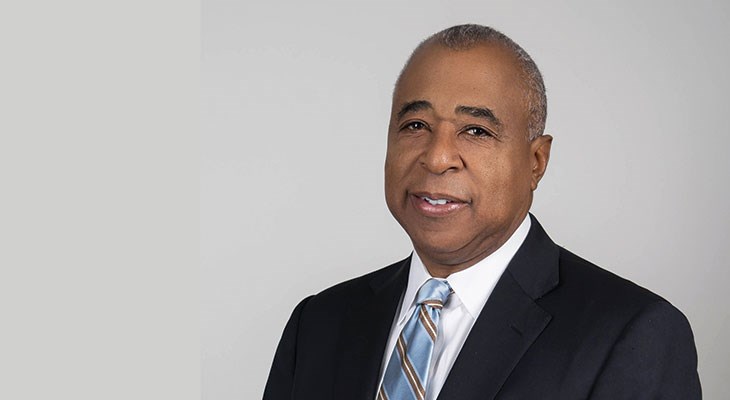Warren Anderson needed to make this deal happen.
His dream of building a career in the broadcasting industry had been dashed and he had turned to entrepreneurship as a way forward. He was intrigued by the distribution and logistics sector and approached McDonald’s with a proposition: He and his business partner, Steve DuBose, would work for almost nothing as they learned how to operate a McDonald’s distribution center.
If they proved themselves worthy, McDonald’s would allow them the opportunity to purchase and operate a facility of their own at the end of this trial period. While it was a necessary step to reach his goal, it was also very stressful.
“We would borrow money on one credit card to pay off another and ask friends and family for money,” Anderson says. “It was a miserable time.”
The hard work and sacrifice ultimately paid off. On Nov. 1, 1991, the duo closed a deal to buy the unit in Solon that would become the foundation for The Anderson-DuBose Co., which has grown to provide supplies to more than 500 McDonald’s and Chipotle restaurants in Ohio, Pennsylvania, New York and West Virginia. In 2012, the company opened a new $28 million, 158,000-square-foot distribution center in Lordstown.
“It wasn't just intelligence,” recalls Anderson, looking back at this pivotal moment in his career. “There are so many more people smarter than me. It was hard work, luck and divine providence.”
Get it done
Anderson admits his approach to dealmaking is less refined than that of many entrepreneurs.
“I'm kind of like a cowboy,” he says. “I went after stuff and if I could buy it and if I thought I could make money and pay down the debt, I did it. I’ve read stories about great minds and great strategies in dealmaking. I didn't really have that.”
Whatever his approach to dealmaking, Anderson understood the value of living up to the terms of any deal that you make.
“It was a multiple against the EBITDA of the company, which I think at that time was six and a half times EBITDA,” Anderson says of the deal that got him into business with McDonald’s. “The company that sold us this first unit was willing to guarantee the debt so that we could get traditional bank financing. We put up a certain amount of money and then the selling company also took paper back. We had a five-year note to pay back.”
While things didn’t work out between Anderson and DuBose, leading to a buyout in 1993, Anderson was able to pay off the debt in just three years.
“You have to really be able to harness your skills,” Anderson says. “You need to have a strong commitment to finish. That sounds so trite, but that's what it takes. You have to persevere.”
In the mid-1990s, Anderson made a pitch to McDonald's to set up their South African distribution for restaurants that they were going to be opening up in the country. He opened distribution centers in Johannesburg, Durban and Cape Town, then acquired Chipotle distribution rights for Ohio, Pennsylvania and West Virginia in 1998 and bought a second McDonald’s distribution center in Pittsburgh in 2007.
“We looked at things and we understood where we could add value and where we could be profitable,” Anderson says. “We tried to stay in our lane, which was distribution, whether it was food or beverages. So I would say for my company, our success has been we've been narrow in the kind of businesses that we look at. We knew what we were doing in our space.”
Trust your instincts
The distribution center in Lordstown allowed Anderson-DuBose to consolidate its Solon and Pittsburgh operations into one facility in 2012. A year later, Anderson bought a distribution center from Golden State Foods in Rochester, which at the time, supplied 220 McDonald’s restaurants. Anderson-DuBose is obviously very reliant on McDonald’s and Chipotle for its business, which could become a problem if anything were to happen to either of the restaurant chains.
“The advantage is I'm not out selling,” Anderson says of his business model. “I mean I don't have a sales force, which is a real advantage. McDonald's and Chipotle both believe in long-term supplier relationships. They are monopolies. On the other hand, our margins are probably lower because we operate with an open book arrangement. And if for some reason we failed in service or if they decide they want a different regional vendor, I'm in trouble. That’s one of the reasons why I bought the beer distributorship, to have diversity in my business.”
Anderson is a shareholder in Capital Distributing, a beer distribution center in Oklahoma City.
“It's smart to continue to grow, but we truly are a high-performing company,” Anderson says. “I'm not saying that just based on my own self-inflated worth. We get measured in any number of categories from all of our customers of how I do against my competition and we're always at the top of the charts in terms of productivity and usually very competitive with pricing. As long as we perform at the level that we've been performing, I feel pretty confident. But yeah, I'm still looking.”




